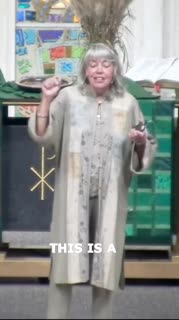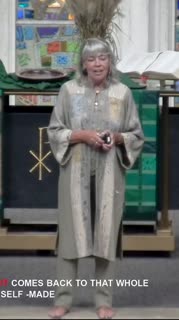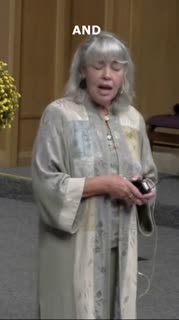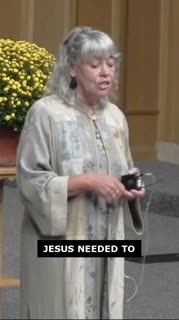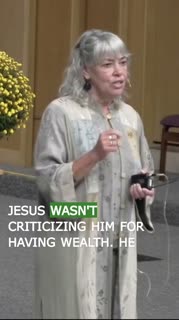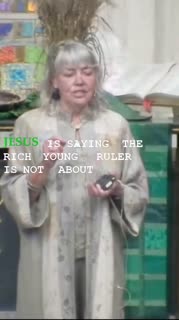Embracing Grace: A Journey of Faith and Gratitude
Devotional
Sermon Summary
Bible Study Guide
Sermon Clips
1) "This is a challenging text to preach, especially here in the United States, where we are one of the wealthiest countries in the world. And the average person sitting in a pew in the United States of America would be considered wealthy in many, many nations. The things that we, most of us, have, like a roof over our head, a bank account, a vehicle, all those things are privileges in many places. So when we look at a text where we're being told you're supposed to sell everything you have and give it all to the poor, that carries a different kind of weight to people who are relatively secure, however they define secure, in their financial being. And it's, it's meant to make you uncomfortable." [23:59] (58 seconds)
2) "It comes back to that whole self-made person. Anybody can pull themselves up by their bootstraps. And if they work hard enough, they will succeed. Now, that doesn't account for those people who simply were born rich. They weren't born into wealth, or acquired it through various other circumstances of being in the right place at the right time. But wealth meant something different throughout Old Testament and Jesus' times. There was a very quid pro quo understanding of righteousness and wealth. Righteousness and possessions. Virtue, faithfulness, and having accumulated power and position. The perception was that if you were good, if you obeyed God's commandments and God's teachings, you would be blessed." [27:31] (51 seconds)
3) "And many people interpret that to mean that it was too much for him and he couldn't do it. But scripture doesn't say that. And I, maybe being a Pollyanna, I like to think that he had to go through a time of grieving, of recognizing the challenge, the difficulty of the task he was being given. But I sure like to think that he was able to. I mean, we know Jesus had more disciples than just the 12, I mean, more followers than just the 12 disciples. I like to think this man joined them at some point. I would like to think that, because it gives me hope." [30:58] (43 seconds)
4) "Jesus needed to walk through this process of turning expectations upside down one more time as he has been doing throughout his ministry of changing people's perceptions. And he needed to do it because of the way the young man earnestly asked his question. He came up to Jesus and said, good teacher, what must I do to inherit eternal life? As if there is a list that you get to check off and therefore have earned the rewards of eternal life. And if that was the case, truly if that was the case, if we could guarantee that we would have all these things, why wouldn't people mark off the list, join church, do all the things they're supposed to do so that they could have what they wanted in the end? Because that's not the way it works." [35:02] (61 seconds)
5) "Jesus wasn't criticizing him for having wealth. He was saying, for you, what you need to do is let it go, and trust in the boldness of grace, of God's grace. The disciples get to this same point when Jesus goes on and says, only those who have left their families and their households and all that they know to follow me and to live out the good news, only they will be able to enter the kingdom of heaven. And Peter, it's like he's got his checklist now. It's like, okay, yeah, we did that. We left everything. We're following you. So we've got this down. And Jesus says, yes, those who genuinely do that, they will receive so much more in this lifetime." [35:02] (52 seconds)
6) "Jesus is saying the rich young ruler is not about what you do do it's about how much you love it's not about selling everything you own just so you can earn something it's about being willing to give the best of yourself to God just because you love God right before the rich young ruler comes up and asks this question of Jesus Jesus had been reminding the disciples about how you needed to have the faith of a child to enter the kingdom of heaven a faith of a child is a faith of a child that's based on not not quid pro quo not I get this for that it's the faith that is based on loving someone that loves you back." [41:59] (54 seconds)
Ask a question about this sermon
2) "It comes back to that whole self-made person. Anybody can pull themselves up by their bootstraps. And if they work hard enough, they will succeed. Now, that doesn't account for those people who simply were born rich. They weren't born into wealth, or acquired it through various other circumstances of being in the right place at the right time. But wealth meant something different throughout Old Testament and Jesus' times. There was a very quid pro quo understanding of righteousness and wealth. Righteousness and possessions. Virtue, faithfulness, and having accumulated power and position. The perception was that if you were good, if you obeyed God's commandments and God's teachings, you would be blessed." [27:31] (51 seconds)
3) "And many people interpret that to mean that it was too much for him and he couldn't do it. But scripture doesn't say that. And I, maybe being a Pollyanna, I like to think that he had to go through a time of grieving, of recognizing the challenge, the difficulty of the task he was being given. But I sure like to think that he was able to. I mean, we know Jesus had more disciples than just the 12, I mean, more followers than just the 12 disciples. I like to think this man joined them at some point. I would like to think that, because it gives me hope." [30:58] (43 seconds)
4) "Jesus needed to walk through this process of turning expectations upside down one more time as he has been doing throughout his ministry of changing people's perceptions. And he needed to do it because of the way the young man earnestly asked his question. He came up to Jesus and said, good teacher, what must I do to inherit eternal life? As if there is a list that you get to check off and therefore have earned the rewards of eternal life. And if that was the case, truly if that was the case, if we could guarantee that we would have all these things, why wouldn't people mark off the list, join church, do all the things they're supposed to do so that they could have what they wanted in the end? Because that's not the way it works." [35:02] (61 seconds)
5) "Jesus wasn't criticizing him for having wealth. He was saying, for you, what you need to do is let it go, and trust in the boldness of grace, of God's grace. The disciples get to this same point when Jesus goes on and says, only those who have left their families and their households and all that they know to follow me and to live out the good news, only they will be able to enter the kingdom of heaven. And Peter, it's like he's got his checklist now. It's like, okay, yeah, we did that. We left everything. We're following you. So we've got this down. And Jesus says, yes, those who genuinely do that, they will receive so much more in this lifetime." [35:02] (52 seconds)
6) "Jesus is saying the rich young ruler is not about what you do do it's about how much you love it's not about selling everything you own just so you can earn something it's about being willing to give the best of yourself to God just because you love God right before the rich young ruler comes up and asks this question of Jesus Jesus had been reminding the disciples about how you needed to have the faith of a child to enter the kingdom of heaven a faith of a child is a faith of a child that's based on not not quid pro quo not I get this for that it's the faith that is based on loving someone that loves you back." [41:59] (54 seconds)
